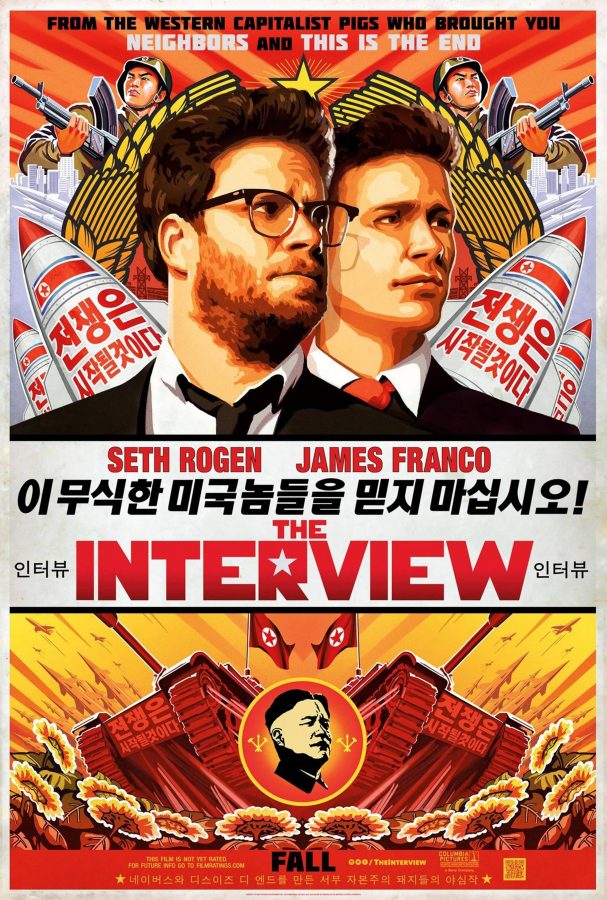Courtesy of nbcnews.com
______________________________
On Christmas day, after causing more controversy than any other films in recent memory, Sony Pictures gave a limited theatrical release to “The Interview”in addition to making it available online through YouTube, Google Play, and other such services the day before. It was an anticlimactic conclusion to a bizarre odyssey, which saw the film at the center of a massive geopolitical controversy and resulted in Sony Pictures being the victim of a vicious cyberattack. The now infamous film, at one point considered scrapped entirely, ended up being released online the day before the original advertised release, with the theatrical release date unchanged.
The film centers around a plot by two Americans, played by James Franco and Seth Rogan, to assassinate Kim Jong-un, the third-generation Supreme Leader of North Korea. The government of North Korea, insulted at the existence of such a movie, condemned Sony Pictures and called the film an “act of war.” The government asked President Obama to prevent the movie’s release, a request that was ignored by the White House.
On November 24, a group calling themselves the “Guardians of Peace”or “GOP”launched a cyberattack on Sony Pictures Entertainment. After leaking a considerable amount of personal information about Sony Pictures employees and their families, e-mails between employees, information about executive salaries at the company and other such company secrets, the GOP demanded the cancellation of the release of “The Interview,” and threatened attacks reminiscent of 9/11 in retaliation should they go unheeded. The United States intelligence services believe that Bureau 121, North Korea’s mysterious cyber-warfare division, was behind the attacks. However,some security experts are dubious that the nation even has the technology to perform such a hack and the North Korean government officially denies any responsibility.
Sony Pictures responded to these hacks and threats initially by giving in. “The Interview”was cancelled and there was no timetable to ever release the film, according to Sony executives. This response was met by a severe backlash from moviegoers. Twitter exploded with condemnation of Sony Picture’s decision. President Obama even weighed in, saying,“We cannot have a society in which some dictator in some place can start imposing censorship in the United States. I wish they’d spoken to me first. I would have told them: do not get into the pattern in which you are intimidated.”A few days after the President made these remarks, Sony announced that they would make the film available online on December 24, with a limited theatrical release of 300 theaters on the 25.
It became the highest grossing online release of 2014 and Sony’s highest grossing online film of all time. It did surprisingly well, given its limited release, making over $40 million.
Film and media studies major Andrew Tuck ’17 was happy that the film saw the light of day.
“It is important for all art to be able to express itself freely,”he said. “It is a vital part of films that they are allowed to be irreverent…we can’t just scrap a film because a foreign dictator tells us to.”
“It doesn’t help their case that they regularly show propaganda that depicts the death of our leaders,”he added.
Certainly it is hard to fault Sony for deciding, in the face of significant threats, to pull one of their movies in the interest of safety. It remains the case, however, that North Korea hasn’t been a significant threat to the United States since the end of the Korean War in 1953. Additionally, while safety is important, it is wrong to allow a terrorist threat to dictate the kind of art we consume. The recent tragedy in France showed us that these kinds threats can be deadly serious, but the response to them has demonstrated that we will not allow the acts of a deranged few to define the freedoms of artistic expression that are vital to a thriving society.
Although I am not doing a review for “The Interview”, it should be noted that it is an incredibly poorly done movie. I sorely wish that a much better film had been at the center of this controversy. I would give it a 55/100 as a film, but I still encourage everyone to see it. Just because North Korea didn’t want us to.





















































































































